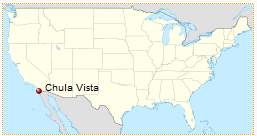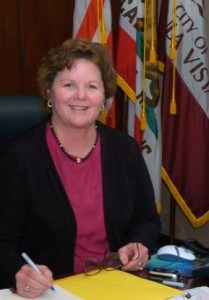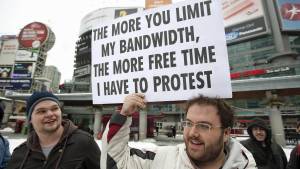 A controversial proposition on the ballot to extend a 1970 telecommunications tax to cell phones and “digital phone” service that largely did not exist when the tax was originally enacted has created a war of words between Chula Vista, Calif., mayor Cheryl Cox and the cable company that bears her last name (but no relation) — Cox Cable.
A controversial proposition on the ballot to extend a 1970 telecommunications tax to cell phones and “digital phone” service that largely did not exist when the tax was originally enacted has created a war of words between Chula Vista, Calif., mayor Cheryl Cox and the cable company that bears her last name (but no relation) — Cox Cable.
The proposed tax extension would broaden the types of telecommunications services that are subject to it, including Cox Cable’s “digital phone” service and broadband. Cox officials appeared at city council meetings to oppose the tax, saying it would result in higher bills for customers.
But when Cox went on the air with “informational ads” the mayor accused of undermining support for Proposition H, Cox and the cable company started trading barbs in the local media.
Now the controversy has drawn the attention of San Diego’s local ABC affiliate. On Monday, Mayor Cox accused Cox Cable of punishing the city by withdrawing free Internet access at the end of the year for City Hall, public libraries, and public safety agencies including the fire and police departments.
Mayor Cox called the timing of Cox’s announcement suspicious, coming the same day she did an interview complaining about Cox on San Diego’s KGTV-TV.
Under the terms of Cox’s franchise agreement with the city, Chula Vista was supposed to receive free Internet service through 2019, but now the cable company is reneging on the deal, a charge Cox Cable vigorously disputes.

Mayor Cox
With Chula Vista’s current budget crisis, the cash-strapped city is weighing the $30,000 a year it will cost to obtain the service at Cox Cable’s business rates, which could cause the city’s 1,012 computers, most available to the public, to lose access Jan. 1st. Mayor Cox is also concerned the police department will lose its own connection, which it uses to communicate with other police departments and the Department of Justice.
The tax at the center of the debate, known as the City’s Utility Users’ Tax or U.U.T., amounts to 5 percent and is charged primarily to landline telephone customers. Because of the way the tax ordinance was worded in 1970, technology changes that have taken place since have allowed more residents to escape paying the tax by switching to cell phone service or “digital phone” Voice Over IP service offered by Cox Cable or other broadband providers.
As a result, potential revenue earned from the tax has dropped over the years, especially as residents disconnect landline service. With Chula Vista facing a $4 million deficit in the city budget, city officials are looking for new revenue sources.
Proposition “H,” before local voters Nov. 2nd, would keep the rate at 5 percent, but extend the tax to other telecommunications services, including:
- Wireless communications
- Text Messaging
- Prepaid/Postpaid telecommunications
- Private communication services
- Paging
- VoIP
- Toll free numbers
“Proposition H is all about continuing to fund the services we all benefit from: maintaining streets and parks, keeping libraries open, and the police protection and fire services that keep us safe,” Mayor Cheryl Cox wrote in a recent guest editorial in the San Diego Union-Tribune.
City officials are warning that without the estimated $5.6 million in estimated revenue from the tax, the city will have to cut services to cover the budget shortfall or raise other taxes.
 Like many cash-strapped communities and states who have watched tax receipts plummet from dramatically lower property tax collections and increases in funding mandates, Chula Vista is trying a combination of budget cuts and tax increases to cover the difference. But local voters are in no mood for tax increases, and last year rejected a proposal to raise the area’s sales tax by one percent.
Like many cash-strapped communities and states who have watched tax receipts plummet from dramatically lower property tax collections and increases in funding mandates, Chula Vista is trying a combination of budget cuts and tax increases to cover the difference. But local voters are in no mood for tax increases, and last year rejected a proposal to raise the area’s sales tax by one percent.
Judging from the well-organized opposition campaign, local voters may be on track to disappoint the city a second time.
Mayor Cox’s editorial advocating approval of the tax extension even met resistance from the newspaper it was printed in:
But business and taxpayer organizations question that claim and contend the long-term tax hike could be much bigger than 5 percent as new communications devices come to the fore. They argue Chula Vista hasn’t done enough to shore up its finances long-term to deserve voter support of a tax increase.
On balance, we agree. While city leaders have overseen some $40 million in budget cuts and eliminated 259 jobs, they mostly have been AWOL on one of the most crucial issues in modern government finance: the extreme cost of public employee pensions.
[…]This framing of the debate is not fair to Chula Vista taxpayers who now cover the entire cost of pensions that allow city firefighters and police officers to retire at age 50 with 90 percent of their final annual pay and general employees to retire at age 60 with 90 percent of annual pay.
These policies must be recognized as unsustainable and then be drastically changed. Only when that happens will Chula Vista’s leaders have the credibility to ask voters to raise their own taxes.
Vote no on Proposition H.
The San Diego South Chamber of Commerce ridiculed the tax as a “dash for cash” and many area small business associations are also opposed.
While the debate rages, the mayor’s office accused Cox Cable of being too cute by half by pretending to be a “neutral” party. The cable company claimed its ads were “informational” and did not take a position either for or against the proposition.
But KGTV notes the ad only mentions groups opposed to the tax — no supporters, and ends with the tagline, “Proposition H: It’s not what it seems.”
An expenditure report obtained by 10News shows Cox Communications spent more than $2,400 on the Proposition “H” ad and additional literature. The report also lists money going towards Proposition H opposition. A Cox spokesman said they wanted to choose “neutral” but had to chose between “support” and “opposed” on the filing.
[flv width=”640″ height=”500″]http://www.phillipdampier.com/video/Chula Vista Debate 10-20-10.flv[/flv]
Three reports from KGTV-TV San Diego trace the dispute over the tax over the last few months. Also included is a portion of a video from a taxpayer’s group opposed to the telecom tax. (13 minutes)


 Subscribe
Subscribe










